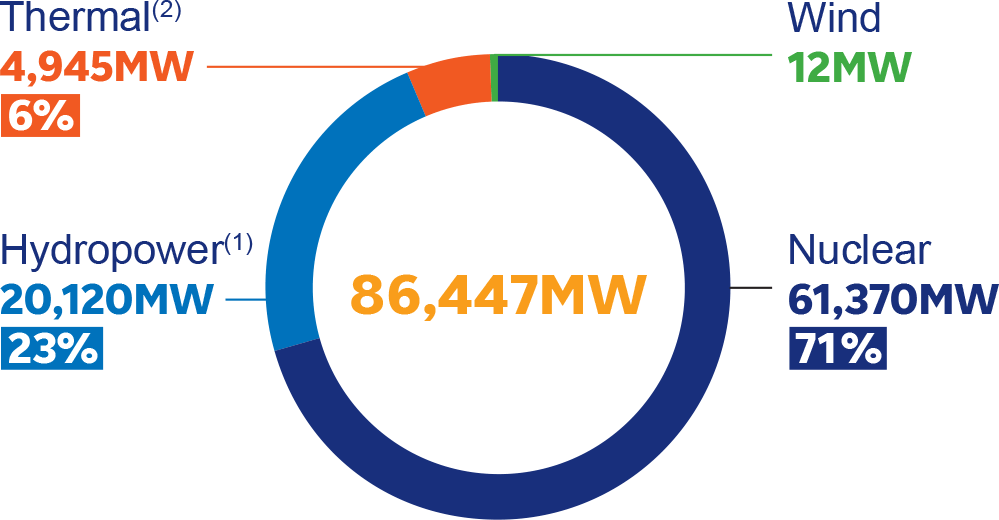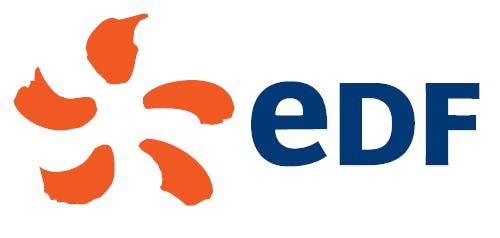Composition and specifications of EDF fleet in mainland France
With a total installed generation capacity of 86.4 GW in mainland France (1) on 31 December 2021, EDF fleet produced 413.1 TWh (2) in mainland France in 2021.
At 31 December 2021, the capacity of EDF’s generation fleet was mainly composed of:
- 56 nuclear units based on pressurised water reactors (PWR), with electrical power capacities ranging from 900 MW to 1,500 MW and an average age of 36 years (see section 1.4.1.1.2 “Nuclear power generation in France”);
- 19 functioning thermal units (see section 1.4.1.2 “Thermal generation in mainland France”);
- 427 hydropower plants, with an average age of 76 years (3) (see section 1.4.1.3.1 “Hydropower generation in France”);
- other hydropower plants owned by the Group’s subsidiaries: ÉS, SHEMA Group, CERGA and RKI (on the Rhine, owned 50%-50% with German energy company EnBW) and the Franco-Swiss entities of Chatelôt and Emosson, accounting for a total of approximately 142 MW of installed capacity in 2020.
EDF installed capacity and output in mainland France – 2021
Installed capacity

- Thermal(2) 4,945 MW 6%
- Hydropower(1) 20,120 MW 23%
- Wind 12 MW
- Nuclear 61,370 MW 71%
- Total: 86,447 MW
Expressed in megawatts of maximum capacity linked to the network.
(1) Excluding Corsica and overseas départements, i.e. 439MW in 2021; including sea energy: 240MW.
(2) Excluding Corsica and overseas départements, i.e. 1,567MW in 2021.
Production d'électricité

- Thermal(3) 10.5 TWh 2.6%
- Hydropower(1)(2) 41.8 TWh 10.1%
- Wind 0.02 TWh
- Nuclear 360.7 TWh 87.3%
- Total: 413 TWh
(1) Excluding Corsica and overseas départements, i.e. 1.3TWh in 2021.
(2) Generation including pumped storage consumption.
(3) Excluding Corsica and overseas départements, i.e. 4.8TWh in 2021.
NB: figures are rounded.
1.4.1.1 Nuclear power generation
1.4.1.1.1 The excell plan
The “excell” plan, announced in December 2019 and finally launched in the spring of 020, aims at enabling the French nuclear industry to return to a high standard of quality and excellence so as to take on existing and future major projects in France, the United Kingdom, and elsewhere in the world. The excell plan also benefits existing nuclear fleet programmes, in particular Grand Carénage and related maintenance operations.
In October 2020, EDF group and the nuclear industry made 25 public commitments, spread across 5 priority areas of work. Most of the commitments of the excell plan have met or exceeded the targets set (4). These accomplishments concern all the areas of the plan:
- the governance of new nuclear projects has been strengthened by establishing a Major Projects Inspection;
- in the area of skills, the Nuclear Industry University (UMN) was created in April 2021 to offer a stimulating range of training offers;
- under the excel plan, 12 standards have been defined in conjunction with the sector to ensure manufacture is “right the first time” compliant. They will be deployed in 2022 with more straightforward contracts that will balance the relationship between EDF and its suppliers. 44 of them have launched their own “Excell in quality” plan and, therefore, it is the entire nuclear sector, led by Gifen, that is committed to the pursuit of excellence;
- standardisation and replication are systematically favoured as factors ensuring quality and safety. For this purpose, required-use catalogues have been prepared in order to streamline the equipment used and favour proven solutions. For example, the number of valves in the catalogue has been divided by 10, dropping from 13,000 to 1,200 references;
- the welding plan strives to ensure quality of workmanship from start to finish. The Cotentin Welding Training Academy (Haute École de Formation Soudage du Cotentin) (Hefaïs) was created in partnership with Orano, Naval Group and CMN, and will welcome its first class in September 2022.
EDF and the entire nuclear industry are now entering the third phase of the excell plan: consolidating the results achieved and perpetuating the actions undertaken in order to attain the highest industrial standards. This objective to capitalise on achievements is reflected in 30 commitments to be met by mid-2022, two-thirds of which are a direct extension of the commitments made in 2021.
All of these full commitments are available at the following address: https://www.edf.fr/plan-excell. See also section 3.4.3.2.1 “Adaptation of skills (excell plan)”.
(1) Excluding Corsica and French overseas départements.
(2) including pumped storage hydropower.
(3) Arithmetic mean.
(4) See the press release of 8 November 2021 “Halfway through the excell plan, EDF and the nuclear industry have presented concrete results and new commitments for 2022”.
